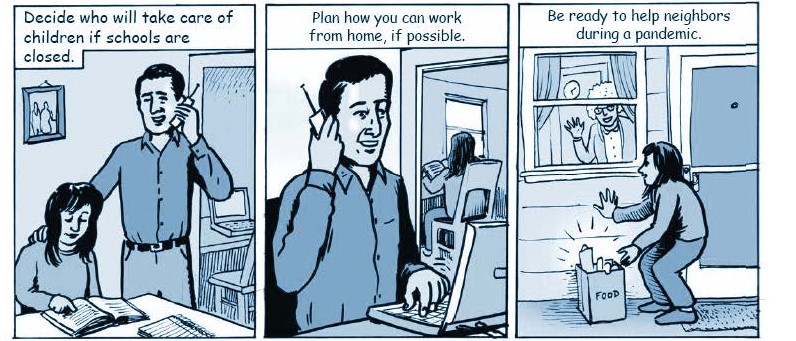
Posted by Meredith Li-Vollmer
With continuing spread of the novel coronavirus (COVID-19) outbreak to more countries, it is increasingly likely that we will see a worldwide spread (or pandemic) that will reach the US at some point. How would a coronavirus pandemic potentially play out and what can we do to protect ourselves and get through it? We asked Dr. Jeff Duchin, Health Officer for Public Health – Seattle & King County.
Q: If we still have a relatively small number of cases of COVID-19 in the US right now, why are health officials talking about planning for possible pandemic?

A: With the growing spread in other countries, we can anticipate that eventually there will be more cases in the United States.
Remember that the term pandemic tells us about the extent of an outbreak – a new virus that spreads readily to many countries around the world – but it doesn’t tell us about the severity of the outbreak.
We still can’t predict exactly when a pandemic outbreak might reach us nor how severe a COVID-19 pandemic might be locally. But if it happens, and that seems likely, it could cause many people to become ill in a short time. This will stress our healthcare system and disrupt many of our regular activities, including school, work, and social events.
Although it’s possible that a severe outbreak will not happen here, it’s better to be prepared for a serious pandemic and not have one than not be ready if it does happen. Containment efforts have bought us valuable time to plan.
It’s important we prepare now in order to reduce the number of illnesses and negative effects that could occur in our community.
Q: What should we expect if there is a COVID-19 pandemic?
A: A pandemic can last for several months. Public health officials may recommend individual and community actions based on the severity of the pandemic that limit exposure and illness.
Many of these recommendations are designed to keep people from spreading illness through crowds or group settings, based on planning done for an influenza pandemic.
As we learn more about how COVID-19 spreads, this guidance will be updated where necessary.
Q: What kinds of community actions might limit the spread of COVID-19?
A: The actions taken will depend on the severity of the outbreak. To prevent COVID-19 from spreading, large gatherings and public events may be postponed or cancelled.
It is not certain whether school and childcare dismissals would be recommended for a COVID-19 pandemic, but they may be.Schools are a place where people are in close contact and have higher potential to spread infectious diseases. School dismissals may happen if a serious pandemic occurs.
Dismissing schools may help slow the spread of disease before a pandemic becomes widespread in the community. School authorities also may decide to dismiss schools if too many students or staff are absent.
School dismissals and other “social distancing” recommendations may be challenging to plan for and implement in your household. However, you may be asked to follow such recommendations for the safety and well-being for your household members and the community.
Be prepared for the possibility that your child’s school (and extracurricular activities) or childcare facility may be temporarily dismissed. During this time, children should not gather in groups in other locations.
Q: What can parents do now to plan for the possibility of school closures?
A: Plan alternative childcare arrangements for children in case school is dismissed. Talk to neighbors or other parents in your child’s school about sharing childcare duties if your children are well but the school is closed.
School closures may also affect the ability of parents and caregivers to go to work. Talk to your employer about policies for working from home or shifting work schedules if schools are dismissed.
Q: How else can people be prepared at work in case there is a local outbreak of COVID-19?
A: Discuss sick-leave policies and telework options for sick workers or those needing to stay home to care for a sick household member. Talk to your supervisor about how work can carry on if there are many employees absent due to illness or because their children can’t go to school or childcare.
Guidance for businesses in planning for a coronavirus pandemic is available from the CDC.
Q: How can people best protect their health and the wellbeing of the community if there’s a COVID-19 pandemic?
A: Plan ways to care for those at greater risk for serious illness and hospitalization, like anyone 65 and older and those with underlying health conditions. Infection can worsen their health conditions, and services they rely on may not be available. CDC will recommend actions to help keep people who are at high risk for complications healthy if a pandemic occurs and we will share that information with you.
If you or your household members have a chronic condition and regularly take prescription drugs, talk to your health care provider, pharmacist, and insurance provider about keeping an emergency supply of medications at home. If you have young children or other dependents, think about who can care for them if you become ill.
Good personal health habits help prevent respiratory infections, including coronaviruses and influenza. These are simple yet effective actions, like staying home when you are sick, covering your coughs and sneezes with an elbow sleeve or tissue, and frequently washing your hands with soap and water (or using at least a 60% alcohol-based hand sanitizer if soap and water are not available).
If a COVID-19 pandemic occurs, public health officials may have additional instructions, such as avoiding close contact with others as much as possible, and staying home if someone in your household is sick.
Q: If there’s a local COVID-19 outbreak, how can we be ready to help each other get through it?
A: One of the best things you can do is get to know your neighbors. Talk with them about how you may be able to help each other if people in your households get sick or if your children aren’t able to go to school or childcare. Can you drop groceries off on their doorstep? Can you take turns looking after children who aren’t sick? If your neighborhood has a website or social media page, consider joining it to stay connected to neighbors, information, and resources.
At this time even though we do not have local community transmission of COVID-19 in the U.S., that will likely change. It’s important to start preparing now and think about how we will be resilient together, before a pandemic, so that we all will be better off should one occur in the coming weeks to months.
For more information:
The CDC has a useful Pandemic Influenza Checklist for Individuals and Families that is also useful to prepare for a COVID-19 pandemic (h
Visit Prepare Your Health to learn more about preparing your household for an emergency.
Updates will be posted to our novel coronavirus website.


